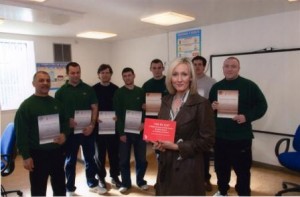
JK Rowling is a supporter of the Shannon Trust’s work (Photo permission of Toe-by-Toe at Shannon Trust)
The government appears to be following a policy of curing, rather than preventing, re-offending.Wales’ prisons are full to bursting; with re-offending on the rise, and young people increasingly in the criminal justice system, it is clear that a link in the prison lifecycle needs to change.
Illiteracy and a lack of qualifications remains a major issue for young offenders throughout England and Wales. After a period of economic decline, when over a million of 18-24 year olds are out of work, figures suggest that it is those who are most in need of help and educational support who are turning to crime. The outlook is not entirely bleak, however, as charities and not for profit organisations in Wales have been working to help prisoners overcome the problems that they meet upon release.
Literacy for life
Much is said about the problems of re-offending, but charities and organisations that help ex-offenders back into work are few and far between. One of the most pressing issues, and one that is also the most surprising, is illiteracy. This is an issue that the Welsh government seems to be giving low priority to- although the Literature Wales’ Write for Life project was funded by the Welsh Assembly, the grant has now run out. LiteratureWales said, “Unfortunately, due to the lack of funds we don’t know when the project is going to start back up again, but it’s something that we may pursue in the future.”
The Shannon Trust is fighting to combat this problem of literacy in prisons. The project, which costs very little money to maintain, is spearheaded by CEO David Ahern. David believes that reading is the first step towards rehabilitation: “It is about engaging the most disengaged people in society, people who have had negative experiences of school, who have been humiliated by not being able to read.” Through the Shannon Trust, prisoners learn to read with the help of a buddy system, which increases self-esteem for both the mentor and the learner. David believes that it is this element that is most conducive to the project’s success. He says, “The project has a profound impact on the learner’s whole life, on their self esteem, and their hopes about the future.” The project is now running in 154 prisons in the UK, including HMP Swansea and HMP Cardiff, but the Shannon Trust believe there is still a long way to go to make the project a cornerstone of the prison system.
A recipe for success
Like the Shannon Trust, other charities are working to ensure prisoners have skills upon their release, and 2012 saw the opening of Wales’s first prison restaurant outside the prison walls. The Clink restaurant takes category D prisoners with less than 6 months remaining on their sentences, and trains them in a professional working environment, and earning them valuable skills and hospitality qualifications.
Chris Moore, Chief Executive of the Clink Charity and Restaurant, observes that there is a close link between a prisoner’s low self-esteem and the likelihood of re-offending. He says, “Leaving prison is shock to the system. In prison, you have a stable, timetabled environment. You are on a process and aren’t in control of own time. We recognised a need for confidence building and introduced a mentoring scheme. It’s so important to have someone to help in that transition; there are lots of challenges to face after the sentence is up.”
The Clink Charity devotes much of its time and resources to combat these challenges, supporting prisoners who have gone through the training system and helping them find work. The result is that a significantly lower number re-offend within the 12 month period, and the men who have been through the programme are very satisfied with the assistance they receive from the charity, and again call to attention the importance of self-esteem. Martin* said, “The Clink Charity has given me a second chance and I have learnt skills that will set me up for life. Putting myself forward for The Clink Charity is one of the best decisions I have made in my life.”
Moving forward
The work that is being done with projects like the Shannon Trust and Clink Charity and Restaurant are clearly making a difference to those prisoners who are engaged in their programmes. Their organisations have hit on a key factor that will improve the lives of young people and help to change one of the key crime issues inBritaintoday. But is the government doing enough work for literacy and qualifications to help improve the self esteem of young people in order to prevent them from re-offending? With a quarter of ex-offenders re-offending within 2 years of release, the figures suggest not.
In a progressive society, it is the sheer number of illiterate people that is most shocking, and it is no coincidence that there is a startlingly high number of young people with poor literacy rates in our prisons. It is only when young people are given the tools they need to achieve in life, through funds being made available to support high impact projects, that the government will start to see that prevention is truly better than a cure.
*Names have been changed and personal details have been omitted to protect the identity of prisoners.
